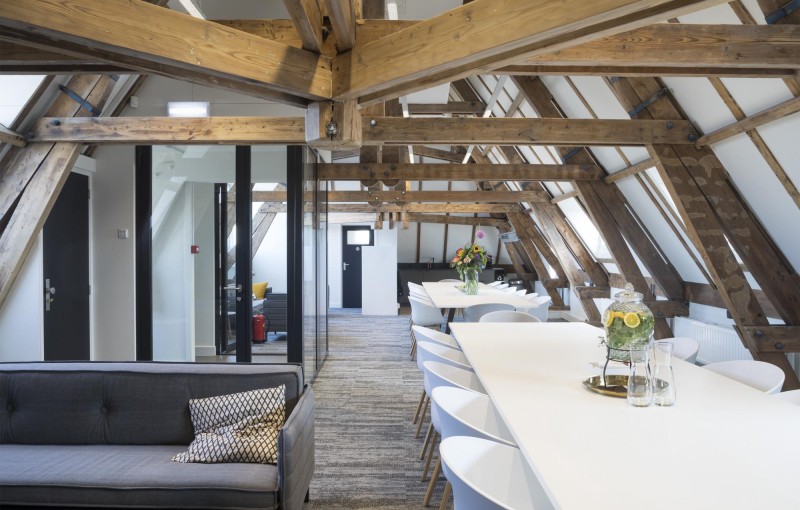
VAT tax when renting an office space

In principle, when you rent an office you do not have to pay VAT on the rental price, since real estate is exempt from VAT. Nevertheless, people often opt together for VAT-exempt leasing because it offers significant advantages. But what about VAT free rent and why do people opt for VAT taxed rent? In this blog you will read all the ins-and-outs about VAT when renting an office.
Taxes for renting office space
Before you rent office space as a (starting) entrepreneur, it is important to be well informed in advance about the additional costs of renting office space and which costs are deductible. We have already written a blog article about the total costs of renting office space. In it, however, we did not discuss VAT and deductions. If you choose to rent office space for your business, you will have to deal with VAT on your rent. The tax authorities make a distinction between a home office and an office outside your home.
VAT and deductions renting office space
If you rent office space, you can deduct all costs you incur for the office space from your company's income. These expenses include:
- Rental costs;
- Renovation costs;
- Energy, - gas, - water, - insurance, - cleaning costs, etc.;
- Printing such as stationery, business cards and envelopes;
- Internet connection;
- Costs for furnishing your office space, such as floor covering, office furniture and the like;
- Depreciation of certain office furniture and equipment.
You can deduct these costs including VAT, to the extent that you cannot deduct the VAT as input tax. From a tax perspective, it is in many cases more attractive to rent temporary office space rather than setting up an office at home, because you can deduct a large part of the costs for tax purposes, while in the case of a home office you have no deductions.
Caution! Special rules apply when renting out meeting rooms for a short period of time, for example. For more information, call the Tax Information Line.
What is input tax?
When a landlord, investor or venture capitalist purchases an office building, they often incur various costs. Since a commercial building or office has a long life time, the input tax on the purchase or construction is spread over ten years. At the time the office building is put into use and the following 9 years, 1/10th part of input tax is charged, also known as the revision period. The VAT on the property can then be deducted as input tax, but only if the property is leased out during the review period subject to VAT.
An exception to the deduction of input tax is if the property is rented out VAT-free during the review period. As a lessor, you are not entitled to deduct input tax.
Why does my landlord pass on the VAT from my office?
In principle, renting out office space is untaxed. You do not have to pay VAT on the rent, so the landlord does not deduct the VAT on the purchase and maintenance of the office building as input tax. However, most cases are jointly agreed to a VAT-taxed rental. This is interesting for most entrepreneurs who use the office almost entirely (90% or in some cases 70%) for VAT-exempt activities. You can deduct these costs, and the net rental costs will be lower. But this does not apply to all businesses. There are a number of industries and business activities that are exempt from VAT. This eliminates the option for taxed rental and the landlord cannot calculate VAT on rent, which means opting for VAT-free rental.
Exceptions office buildings exempt from VAT
In some situations an office is exempt from VAT, for example if the building has been owned by the owner for more than 10 years. If you want to rent an office exempt from VAT, there are certain rules associated with this. In many of these cases you have to deal with a VAT offset on the rent. This applies if the owner has recently carried out renovations, for example, and will then offset the VAT on this with the rent. The VAT compensation is included in the rental agreement and is usually 5%. This is always a lot less than the 21% VAT that you would otherwise be unable to reclaim.
Make use of VAT-exempt rental or leasing
Opting for VAT-free leasing of office space may seem attractive, but VAT-taxed leasing ultimately provides a tax advantage on the cost of your office. Landlords can deduct the VAT on the purchase of the office building, maintenance and renovation as input tax. Tenants, whose business consists of at least 90% VAT taxed business activities, can then deduct the VAT as input tax. This is advantageous because you then end up with a net lower rent. This VAT is deducted from the sales tax that you pay as a company and results in significant cost savings.
If you opt for VAT-free rent, the landlord will opt for a VAT compensation. The VAT offset is included in the rental contract and results in a non-deductible cost increase.
Need help with VAT when renting office space? This blog has been prepared with the aim of informing around VAT. Although the information is carefully prepared, we cannot give specific advice on your situation because we are not tax specialists. The office specialists of flexas.com are ready to assist you but for more detailed information we recommend you to contact a tax expert.


